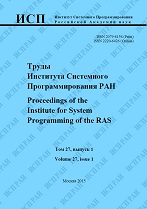|
Using the identification of threads of execution when solving problems of full-system analysis of binary code
I. A. Vasilieva, P. M. Dovgalyukb, M. A. Klimushenkovaa
a Ivannikov Institute for System Programming of the RAS
b Yaroslav-the-Wise Novgorod State University
Abstract:
Dynamic binary analysis, that is often used for full-system analysis, provides the analyst with a sequence of executed instructions and the content of RAM and system registers. This data is hard to process, as it is low-level and demands a deep understanding of studied system and a high-skileed professional to perform the analysis. To simplify the analysis process, it is necessary to bring the input data to a more user-friendly form, i.e. provide high-level information about the system. Such high-level information would be the program execution flow. To recover the flow of execution of a program, it is important to have an understanding of the procedures being called in it. You can get such a representation using the function call stack for a specific thread. Building a call stack without information about the running threads is impossible, since each thread is uniquely associated with one stack, and vice versa. In addition, the very presence of information about flows increases the level of knowledge about the system, allows you to more subtly profile the object of research and conduct a highly focused analysis, applying the principles of selective instrumentation. The virtual machine only provides low-level data, thus, there is a need to develop a method for automatic identification of threads in the system under study, based on the available data. In this paper, the existing approaches to the implementation of obtaining high-level information in full-system analysis are considered and a method is proposed for recovering thread info during full-system emulation with a low degree of OS-dependency. Examples of practical use of this method in the implementation of analysis tools are also given, namely: restoring the call stack, detecting suspicious return operations, and detecting calls to freed memory in the stack. The testing presented in the article shows that the slowdown imposed by the described algorithms allows working with the system under study, and comparison with the reference data confirms the correctness of the results obtained by the algorithms.
Keywords:
full-system instrumentation, call stack, vulnerabilities detection.
Citation:
I. A. Vasiliev, P. M. Dovgalyuk, M. A. Klimushenkova, “Using the identification of threads of execution when solving problems of full-system analysis of binary code”, Proceedings of ISP RAS, 33:6 (2021), 51–66
Linking options:
https://www.mathnet.ru/eng/tisp645 https://www.mathnet.ru/eng/tisp/v33/i6/p51
|

|




 Contact us:
Contact us: Terms of Use
Terms of Use
 Registration to the website
Registration to the website Logotypes
Logotypes








 Citation in format
Citation in format 